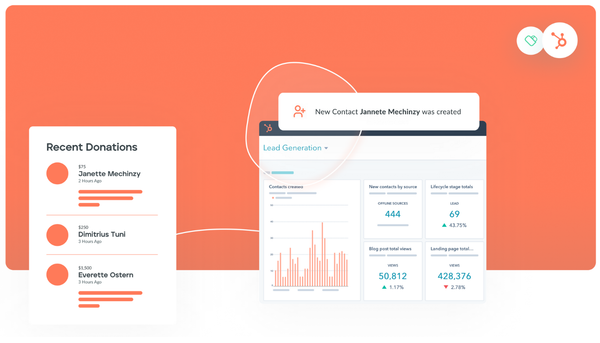Cultivating a Culture of Philanthropy: How to Engage Your Entire Team in Fundraising
Learn effective strategies for non-profit leaders to cultivate a culture of philanthropy, inspiring every team member to go beyond their daily responsibilities and make a lasting difference.

In today's society, where social and environmental challenges persist, it is vital for non-profits to involve their teams in fundraising efforts. When team members feel a genuine connection to the cause and actively participate in fundraising, they become ambassadors, advocates, and catalysts for transformation. They bring not only their skills and expertise but also their personal networks and spheres of influence, amplifying the collective impact of our work.
By instilling a culture of philanthropy, we inspire team members to surpass their daily responsibilities. Fundraising transcends a mere transactional task; it becomes an avenue for personal growth, meaningful connections, and a shared purpose. Together, we can unlock the full potential of our organization, harnessing the collective power of our team to effect lasting change.
In this blog article, we'll explore effective strategies that empower you, as non-profit leaders, to cultivate a culture of philanthropy within your organization. Through leading by example, effective communication, providing training and resources, and recognizing contributions, we will create an environment where every team member feels valued, inspired, and motivated to contribute their time, skills, and resources to make a significant impact.
Let's dive in and unlock the full potential of your team's collective philanthropic spirit.
Lead by Example
Leading by example is a powerful way to inspire and motivate your team members to embrace philanthropy and fundraising. Here are some tangible actions and inspiration to guide you in cultivating a culture of philanthropy through your own leadership:
Personal Involvement: Actively participate in fundraising activities yourself, and openly share your personal connection to the cause and the impact it has had on your life. By immersing yourself in these activities and sharing these experiences, you demonstrate that fundraising is not just a task but a meaningful experience.
Recognize and Appreciate Team Efforts: Publicly acknowledge and appreciate the fundraising efforts of your team members. Highlight their achievements during team meetings, share success stories through internal communication channels, or create a "Fundraising Champion of the Month" program. By recognizing their dedication, you inspire others to step up and actively participate in fundraising initiatives.
Encourage Cross-Functional Collaboration: Foster collaboration between different departments or teams within your organization. Encourage knowledge-sharing sessions where individuals can exchange ideas and learn from each other's experiences. This collaboration can spark creative fundraising strategies and promote a sense of unity among team members.
Seek Feedback and Ideas: Create an environment where open communication is encouraged. Seek feedback and ideas from your team members regarding fundraising initiatives. Encourage them to share their thoughts on potential strategies, events, or partnerships. By involving them in the decision-making process, you empower them to take ownership of the fundraising efforts.
Remember, leading by example is not a one-time action but an ongoing commitment. Continuously demonstrate your passion, dedication, and belief in the power of philanthropy. By doing so, you inspire your team members to follow suit, creating a culture where everyone is actively engaged in fundraising and aligned with the organization's mission.
Communicate the Impact
Effective communication is vital in engaging your team members in fundraising efforts. By transparently sharing the impact of their contributions, you can foster a deeper connection to the cause and inspire their ongoing support. Consider these strategies to empower you in effectively communicating the impact and ignite your team's unwavering engagement in fundraising efforts:
Quantify the Impact: Whenever possible, quantify the impact of the funds raised. For example, express the number of lives touched, the communities served, or the environmental benefits achieved. Use visual representations, such as infographics or charts, to make the impact more tangible and accessible. When your team members can see the concrete results of their efforts, it reinforces their belief in the cause and motivates them to continue their fundraising endeavors.
Connect Team Members with Beneficiaries: Whenever feasible, facilitate opportunities for your team members to directly interact with the beneficiaries or recipients of the organization's work. Arrange visits to project sites, organize virtual meetings with individuals who have been positively impacted, or invite guest speakers to share their stories. These personal connections provide a powerful firsthand experience and deepen their understanding of the impact their fundraising efforts can make.
Create Impact Reports: Develop comprehensive impact reports that showcase the progress, achievements, and outcomes resulting from the combined efforts of your team. Include relevant data, success stories, and visuals to provide a comprehensive overview of the organization's impact. Distribute these reports to your team members regularly, allowing them to see the collective impact of their fundraising endeavors.
By effectively communicating the impact of their fundraising efforts, you foster a sense of pride, purpose, and connection to the cause. It reinforces the notion that their contributions truly matter and inspires them to continue their philanthropic endeavors.
Provide Training and Resources
To engage your entire team in fundraising, it is also crucial to equip them with the necessary skills and knowledge. By providing comprehensive training and valuable resources, you empower your team members to become effective fundraisers. Here are tangible actions and inspiration to guide you in this endeavor:
Fundraising Workshops and Webinars: Organize workshops or webinars led by fundraising experts or experienced professionals. These sessions can cover topics such as donor cultivation, effective communication strategies, event planning, and leveraging technology for fundraising. Encourage team members to actively participate, ask questions, and share their own experiences.
Role-Playing and Practice Sessions: Conduct role-playing exercises where team members can practice making fundraising pitches or conducting donor meetings. Provide constructive feedback to help them refine their approach and build confidence. By simulating real-life scenarios, you prepare them for various fundraising situations they may encounter.
Mentorship and Peer Support: Establish a mentorship program where experienced fundraisers can provide guidance, share best practices, and offer support. Foster a culture of peer learning and collaboration, and create a safe space where they can discuss challenges, brainstorm ideas, and seek advice from one another.
Fundraising Toolkits: Create comprehensive fundraising toolkits that include practical resources and templates. These can include sample donation request letters, social media posts, email campaigns, event planning checklists, and thank-you note templates. Ensure the toolkits are easily accessible to all team members and regularly update them with new resources and best practices.
Remember, fundraising skills are developed over time, and continuous learning is key. Encourage a growth mindset within your team, where they embrace new strategies, adapt to changing trends, and learn from both successes and setbacks.
By providing training and resources, you empower your team members to become effective fundraisers and ambassadors for your cause. As they gain confidence and expertise, their passion and dedication will shine through in their fundraising efforts, driving greater success for your non-profit organization.
Recognize and Celebrate Contributions
Recognizing and celebrating the efforts of your team members is vital in fostering a culture of philanthropy within your organization. When individuals feel appreciated and valued for their fundraising contributions, it fuels their motivation and inspires others to actively engage. Here are tangible actions and inspiration to guide you in recognizing and celebrating the contributions of your team members:
Personalized Thank-You Messages: Express your appreciation through personalized thank-you messages or notes. Acknowledge the specific impact their fundraising efforts have had on the organization's mission. Be specific in highlighting their unique strengths and contributions. These personalized gestures demonstrate that their efforts are noticed and valued, fostering a sense of pride and belonging.
Fundraising Leaderboards: Create friendly competition and a sense of excitement by implementing fundraising leaderboards. Display the progress and achievements of individual team members or teams in a visible space. This visual representation of fundraising milestones encourages healthy competition, motivates individuals to push their limits, and fosters a collective spirit of achievement.
Incentive Programs: Develop incentive programs to reward exceptional fundraising performance. Offer tangible rewards such as gift cards, recognition plaques, or additional paid time off. You can also consider non-monetary incentives, such as professional development opportunities or the chance to lead a high-impact fundraising initiative. These incentives provide tangible recognition for their dedication and serve as an inspiration for others to strive for excellence.
Celebratory Events: Organize celebratory events or gatherings to honor the fundraising accomplishments of your team members. It could be an annual gala, a team outing, or a simple appreciation luncheon. These events provide an opportunity to celebrate as a collective, recognize individual achievements, and foster a sense of camaraderie and shared purpose.
By recognizing and celebrating the contributions of your team members, you create a positive and supportive environment where fundraising becomes a source of pride and fulfillment.
As leaders in the non-profit space, you have the privilege and responsibility to shape a culture of philanthropy that fuels positive change. Imagine the possibilities when an entire team is united in their commitment to making a difference. Together, you can create a ripple effect of positive change that extends far beyond what any individual effort could achieve. Each team member brings unique skills, perspectives, and networks that, when combined, have the power to create a transformative impact.
Through this culture of philanthropy, fundraising becomes more than just a task. It becomes an opportunity for personal growth, meaningful connection, and shared purpose. It becomes a catalyst for social change, a vehicle for empowerment, and YOU create a legacy that extends far beyond the walls of your organization.
Start today. Empower your team. Change the world.





